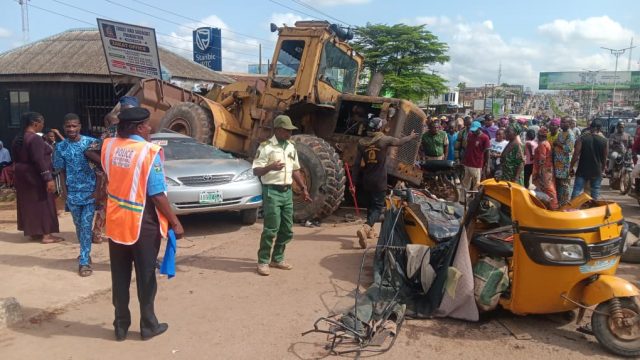Tragedy struck on the busy Sagamu Expressway in Ogun State yesterday as a pregnant woman lost her life following a devastating road accident involving three vehicles. Local authorities have confirmed that the incident, which has left several others wounded, brings renewed calls for improved road safety measures on major Nigerian highways, particularly in Ogun—a state notorious for high vehicular traffic and frequent crashes.
According to Babatunde Akinbiyi, spokesperson for the Ogun State Traffic Compliance and Enforcement Corps (TRACE), the fatal collision occurred when the driver of a Toyota Camry (marked AAB-248 MK) lost control of the car, swerved from his lane, and collided into a commercial tricycle (Keke Napep) with registration JGB-643 VD, as well as a payloader. “It was a tragic scene as the Toyota Camry ran into the moving tricycle, instantly killing the expectant mother inside,” Akinbiyi stated while addressing reporters at the crash site.
The accident unfolded in a matter of seconds along a notoriously busy corridor, highlighting the vulnerability of both public and commercial commuters who rely on the expressway. Eye-witnesses recounted scenes of panic and confusion immediately following the impact, as bystanders rushed to assist the injured. “We heard a loud sound and saw people running. Some jumped out to help, but the woman was already gone by the time help arrived,” said Mr. Dayo Adeniyi, a nearby shop owner who witnessed the aftermath.
Beyond the heart-wrenching loss of life, a further number of people, including male passengers from both vehicles and the payloader operator, sustained injuries ranging from minor cuts to serious head trauma. Local residents and passers-by quickly mobilized to transport victims to hospitals in Sagamu, reflecting the communal spirit often witnessed in Nigerian emergencies. However, the body of the deceased was taken to a yet-to-be-named morgue, the TRACE official confirmed.
Rising Concern: The Ogun Expressway and Its Deadly Reputation
Ogun State—and the Sagamu axis in particular—has consistently recorded a high number of road accidents. According to data from the Federal Road Safety Corps (FRSC), Ogun ranks among Nigeria’s top states for vehicular fatalities. In the first six months of the past year alone, the state recorded over 300 road-related incidents, many resulting in injuries or deaths. Analysts say a combination of poor road conditions, reckless driving, and insufficient law enforcement contribute to these bleak statistics.
“What happened yesterday is sadly not unexpected on our roads,” lamented Mrs. Funke Adewale, a road safety advocate based in Abeokuta. “We see too many cases in which drivers speed, ignore traffic rules, or lose control due to poor maintenance or fatigue. More must be done to educate drivers and enforce penalties for violations.”
Understanding the Legal and Structural Issues
Under Nigerian law, reckless or negligent driving that leads to loss of life is a serious criminal offence, punishable by imprisonment and fines. However, enforcement remains difficult: lack of traffic cameras, limited emergency medical response, and crowded expressways mean that responsibility for such accidents is often hard to assign in a court of law. Road safety experts urge greater investment in both infrastructure and public awareness campaigns.
Mr. Ahmed Ismail, a transport analyst who has worked with both government and private sectors, adds, “We need not just more police check-points but also better-designed roads, clearer signage, and regular roadworthiness inspections for all vehicles—especially public transport like tricycles and commercial buses.” According to Ismail, many of the Keke and taxi drivers lack adequate training or licensing, which can contribute to dangerous situations.
Comparing Regional and Global Challenges
The issue of road safety is not unique to Nigeria. According to World Health Organization (WHO) statistics, Africa suffers the world’s highest fatality rates from traffic accidents, with sub-Saharan regions like West Africa particularly affected. Poor infrastructure, vehicle overloading, and lax law enforcement are common denominators across Ghana, Togo, Benin, and other neighboring countries.
In Ghana, the government recently launched fresh public awareness drives after a series of high-profile accidents, echoing Nigeria’s repeated efforts. Despite such initiatives, road traffic injuries remain among the top three causes of death for West Africans aged 5–44, highlighting the urgent need for cross-border collaboration and knowledge sharing within the region.
Communities Grieve and Demand Action
As Sagamu recovers from this latest tragedy, the affected community is in mourning—and social media is abuzz with calls for justice and reform. Community members, advocacy groups, and local leaders are urging government agencies to step up enforcement and infrastructure development.
A community youth leader, Mr. Samuel Olukoya, told reporters: “We cannot continue to lose innocent lives to road accidents. We need speed breakers, functional traffic lights, and visible road markings. Above all, there must be consequences for reckless drivers—otherwise, these tragedies will keep happening.”
Looking Forward: The Road Ahead
With tragedies like this, the conversation must turn not just to grieving families but to lasting solutions. Continued advocacy, public education on traffic rules, and strict regulatory action are needed to keep roads safe—not just for adults, but also for vulnerable groups like children and pregnant women.
As Nigeria—and West Africa at large—seeks to modernize its transport infrastructure, stakeholders stress that the true test of progress lies in reducing road fatalities and ensuring families do not continue to suffer such needless losses. It is only through the joint efforts of community, government, and the private sector that meaningful change can be achieved.
How can Nigerian roads be made safer for every commuter, regardless of status or vehicle? What steps should local and regional governments prioritize next? Drop your comments below—your voice matters in the national drive for safer highways. For more on this story and important updates from your community, follow us for the latest developments.










